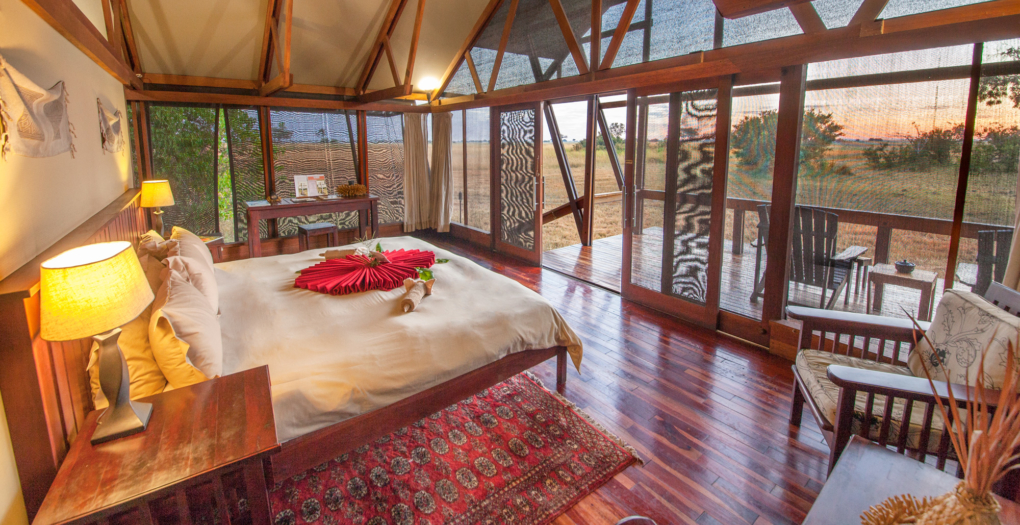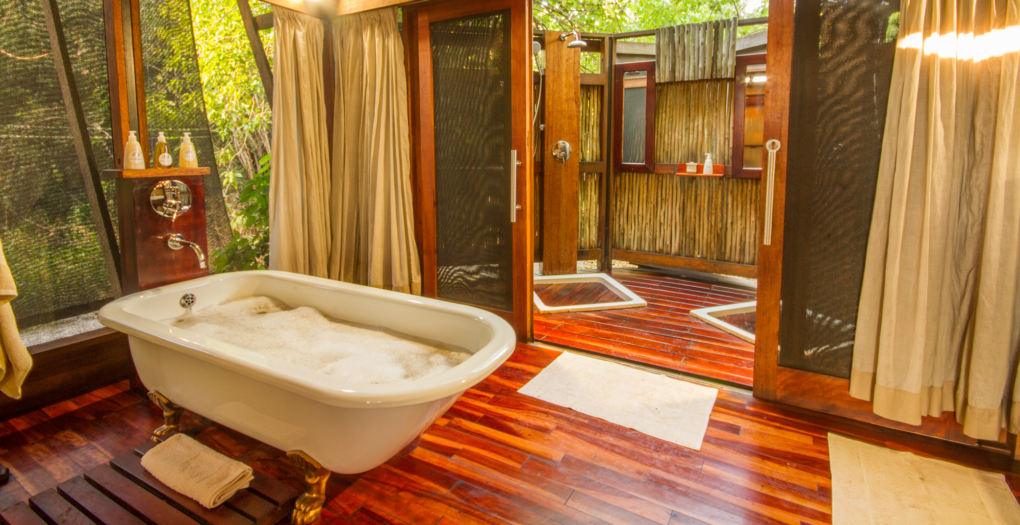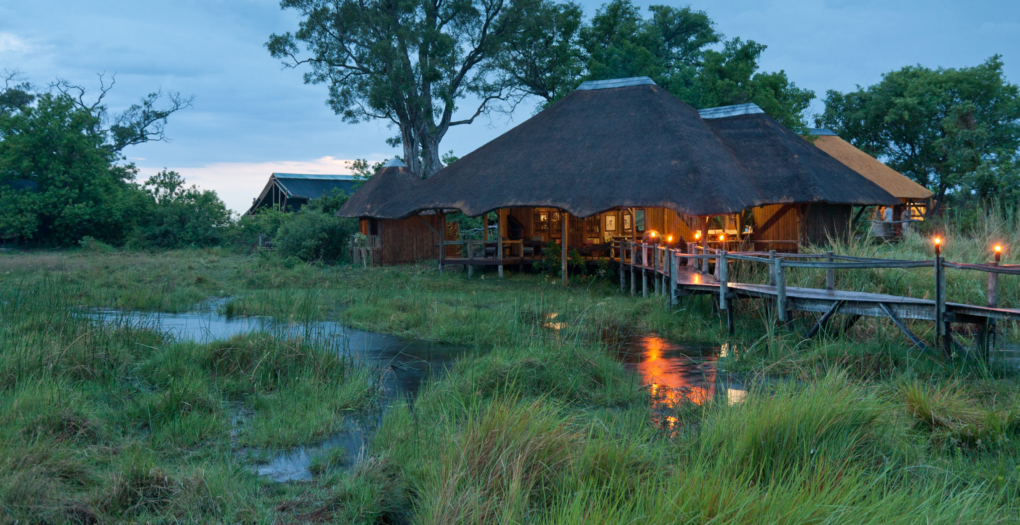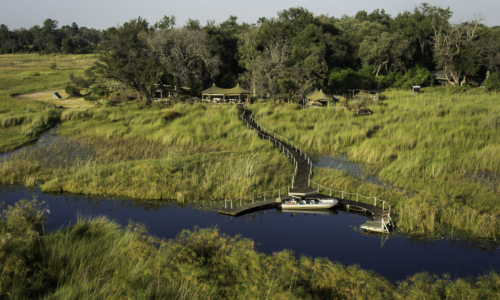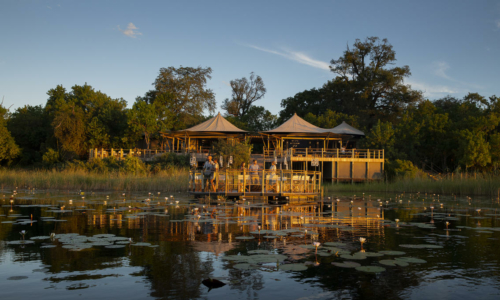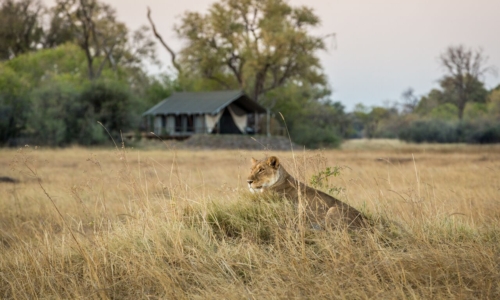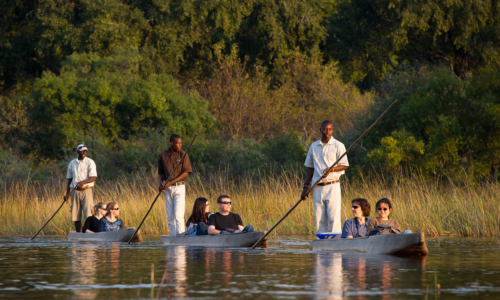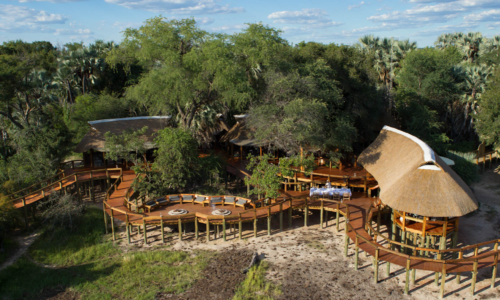Lebala Camp has nine large tented chalets constructed on elevated decks including a two-bedroom family room perched on the banks of the Linyanti marshes. Large twin three-quarter-size beds are provided but can be converted to doubles. Each unit has a balcony with deck chairs as well as a small inside sitting area. A canvas wall divides the bedroom from the bathroom, which features a luxurious claw-footed bath, twin washbasins, and a separate cubicle with flushing toilet. Sliding doors at the back of the chalet lead to an outside double shower. While sandy pathways connect the chalets to the camp’s main area.
The camp is in the southern part of the Kwando Concession, adjacent to the head waters of the Linyanti marshes that form the boundary between Botswana and Namibia. Kwando is currently the largest private wildlife reserve in Botswana, covering 900 square miles of unfenced wilderness in the far north of the country. Lebala means “wide open spaces” in Setswana, and the scenery is dominated by vast plains with scattered palms and tree islands backed by wooded savannas. The Kwando River attracts big game in surprising concentrations, especially during the dry months in Botswana from May to October. Elephant and hippo are frequently visible from the camp and spotted-necked otters are often seen performing in the water.
Daily and nightly game drives into the bush provide the best animal encounters. For a unique perspective on the environment, guests can also cruise the river in traditional dug-out canoes called mokoro which are steered with long poles. This the best way to see hippos, crocodiles, and elephants bathing in the water as well as the Delta’s abundant bird life including Pel’s fishing owl. Nature walks take in the smaller details and animals missed from the vehiles. Anglers will enjoy fishing tilapia including the olive bream or nembwe, red breasted tilapia, purple faced largemouth and three spot tilapia, as well as the sharp tooth catfish, African pike, and the mighty Tiger fish.
Guests reach the camp’s main area via a small footbridge over lily-dotted water. The large bar and lounge are furnished with comfortable chairs and sofas for relaxation. The fire pit is central to morning and evening life at camp. Game viewing from the camp decks is surprisingly good. Seasonal herds of elephant and buffalo converge on nearby riverbanks, and a pack of wild dog regularly den close to the camp


- Atzaro Okavango
- Baines’ Camp
- Camp Kalahari
- Camp Moremi
- Camp Okavango
- Camp Xakanaxa
- Chief’s Camp
- Chitabe Camp
- Chitabe Lediba Camp
- Chobe Chilwero
- Chobe Game Lodge
- Chobe Under Canvas
- Dinaka
- Duba Explorers Camp
- Duba Plains Camp
- Duke’s Camp
- DumaTau Camp
- Eagle Island Lodge
- Elela
- Elephant Pan
- Gomoti Plains Camp
- Gomoti Private
- Gunn’s Camp
- Jacana Camp
- Jack’s Camp
- Jao Camp
- Kalahari Plains Camp
- Kanana
- Karangoma
- Khwai Leadwood
- Khwai Lediba
- King’s Pool Camp
- Kiri Camp
- Kubu Lodge
- Kwara Camp
- Kwetsani Camp
- Lagoon Camp
- Lebala Camp
- Leroo La Tau
- Linyanti Bush Camp
- Linyanti Ebony
- Linyanti Tented Camp
- Little DumaTau
- Little Kwara Camp
- Little Machaba
- Little Mombo Camp
- Little Sable
- Little Tubu Camp
- Little Vumbura Camp
- Machaba Camp
- Mashatu Euphorbia Villas
- Mashatu Lodge
- Mashatu Tented Camp
- Maxa Camp
- Mbamba
- Meno A Kwena
- Migration Expeditions
- Mokete Camp
- Mokolwane
- Mombo Camp
- Monachira Camp
- Moremi Crossing
- Muchenje Safari Lodge
- Ngoma Safari Lodge
- North Island Okavango
- Nxabega Okavango Tented Camp
- Nxai Pan Camp
- Nxamaseri Island Lodge
- Okavango Explorers Camp
- Okuti
- Pelo Camp
- Planet Baobab
- Pom Pom Camp
- Qorokwe Camp
- Sable Alley
- San Camp
- Sandibe Okavango Safari Lodge
- Savute Elephant Lodge
- Savute Safari Lodge
- Savute Under Canvas
- Savuti Camp
- Selinda Camp
- Selinda Explorers Camp
- Shinde
- Shinde Enclave
- Sitatunga Private Island Camp
- Skybeds
- Splash Camp
- Stanley’s Camp
- Tau Pan Camp
- Tawana
- Thamo Telele
- Tubu Tree Camp
- Tuli Safari Lodge
- Tuludi
- Vumbura Plains Camp
- Xaranna Camp
- Xigera Safari Lodge
- Xudum Okavango Delta Lodge
- Xugana Island Lodge
- Zarafa Camp
- Atzaro Okavango
- Baines’ Camp
- Camp Kalahari
- Camp Moremi
- Camp Okavango
- Camp Xakanaxa
- Chief’s Camp
- Chitabe Camp
- Chitabe Lediba Camp
- Chobe Chilwero
- Chobe Game Lodge
- Chobe Under Canvas
- Dinaka
- Duba Explorers Camp
- Duba Plains Camp
- Duke’s Camp
- DumaTau Camp
- Eagle Island Lodge
- Elela
- Elephant Pan
- Gomoti Plains Camp
- Gomoti Private
- Gunn’s Camp
- Jacana Camp
- Jack’s Camp
- Jao Camp
- Kalahari Plains Camp
- Kanana
- Karangoma
- Khwai Leadwood
- Khwai Lediba
- King’s Pool Camp
- Kiri Camp
- Kubu Lodge
- Kwara Camp
- Kwetsani Camp
- Lagoon Camp
- Lebala Camp
- Leroo La Tau
- Linyanti Bush Camp
- Linyanti Ebony
- Linyanti Tented Camp
- Little DumaTau
- Little Kwara Camp
- Little Machaba
- Little Mombo Camp
- Little Sable
- Little Tubu Camp
- Little Vumbura Camp
- Machaba Camp
- Mashatu Euphorbia Villas
- Mashatu Lodge
- Mashatu Tented Camp
- Maxa Camp
- Mbamba
- Meno A Kwena
- Migration Expeditions
- Mokete Camp
- Mokolwane
- Mombo Camp
- Monachira Camp
- Moremi Crossing
- Muchenje Safari Lodge
- Ngoma Safari Lodge
- North Island Okavango
- Nxabega Okavango Tented Camp
- Nxai Pan Camp
- Nxamaseri Island Lodge
- Okavango Explorers Camp
- Okuti
- Pelo Camp
- Planet Baobab
- Pom Pom Camp
- Qorokwe Camp
- Sable Alley
- San Camp
- Sandibe Okavango Safari Lodge
- Savute Elephant Lodge
- Savute Safari Lodge
- Savute Under Canvas
- Savuti Camp
- Selinda Camp
- Selinda Explorers Camp
- Shinde
- Shinde Enclave
- Sitatunga Private Island Camp
- Skybeds
- Splash Camp
- Stanley’s Camp
- Tau Pan Camp
- Tawana
- Thamo Telele
- Tubu Tree Camp
- Tuli Safari Lodge
- Tuludi
- Vumbura Plains Camp
- Xaranna Camp
- Xigera Safari Lodge
- Xudum Okavango Delta Lodge
- Xugana Island Lodge
- Zarafa Camp

Lebala Camp has nine large tented chalets constructed on elevated decks including a two-bedroom family room perched on the banks of the Linyanti marshes. Large twin three-quarter-size beds are provided but can be converted to doubles. Each unit has a balcony with deck chairs as well as a small inside sitting area. A canvas wall divides the bedroom from the bathroom, which features a luxurious claw-footed bath, twin washbasins, and a separate cubicle with flushing toilet. Sliding doors at the back of the chalet lead to an outside double shower. While sandy pathways connect the chalets to the camp’s main area.
The camp is in the southern part of the Kwando Concession, adjacent to the head waters of the Linyanti marshes that form the boundary between Botswana and Namibia. Kwando is currently the largest private wildlife reserve in Botswana, covering 900 square miles of unfenced wilderness in the far north of the country. Lebala means “wide open spaces” in Setswana, and the scenery is dominated by vast plains with scattered palms and tree islands backed by wooded savannas. The Kwando River attracts big game in surprising concentrations, especially during the dry months in Botswana from May to October. Elephant and hippo are frequently visible from the camp and spotted-necked otters are often seen performing in the water.
Daily and nightly game drives into the bush provide the best animal encounters. For a unique perspective on the environment, guests can also cruise the river in traditional dug-out canoes called mokoro which are steered with long poles. This the best way to see hippos, crocodiles, and elephants bathing in the water as well as the Delta’s abundant bird life including Pel’s fishing owl. Nature walks take in the smaller details and animals missed from the vehiles. Anglers will enjoy fishing tilapia including the olive bream or nembwe, red breasted tilapia, purple faced largemouth and three spot tilapia, as well as the sharp tooth catfish, African pike, and the mighty Tiger fish.
Guests reach the camp’s main area via a small footbridge over lily-dotted water. The large bar and lounge are furnished with comfortable chairs and sofas for relaxation. The fire pit is central to morning and evening life at camp. Game viewing from the camp decks is surprisingly good. Seasonal herds of elephant and buffalo converge on nearby riverbanks, and a pack of wild dog regularly den close to the camp

- Atzaro Okavango
- Baines’ Camp
- Camp Kalahari
- Camp Moremi
- Camp Okavango
- Camp Xakanaxa
- Chief’s Camp
- Chitabe Camp
- Chitabe Lediba Camp
- Chobe Chilwero
- Chobe Game Lodge
- Chobe Under Canvas
- Dinaka
- Duba Explorers Camp
- Duba Plains Camp
- Duke’s Camp
- DumaTau Camp
- Eagle Island Lodge
- Elela
- Elephant Pan
- Gomoti Plains Camp
- Gomoti Private
- Gunn’s Camp
- Jacana Camp
- Jack’s Camp
- Jao Camp
- Kalahari Plains Camp
- Kanana
- Karangoma
- Khwai Leadwood
- Khwai Lediba
- King’s Pool Camp
- Kiri Camp
- Kubu Lodge
- Kwara Camp
- Kwetsani Camp
- Lagoon Camp
- Lebala Camp
- Leroo La Tau
- Linyanti Bush Camp
- Linyanti Ebony
- Linyanti Tented Camp
- Little DumaTau
- Little Kwara Camp
- Little Machaba
- Little Mombo Camp
- Little Sable
- Little Tubu Camp
- Little Vumbura Camp
- Machaba Camp
- Mashatu Euphorbia Villas
- Mashatu Lodge
- Mashatu Tented Camp
- Maxa Camp
- Mbamba
- Meno A Kwena
- Migration Expeditions
- Mokete Camp
- Mokolwane
- Mombo Camp
- Monachira Camp
- Moremi Crossing
- Muchenje Safari Lodge
- Ngoma Safari Lodge
- North Island Okavango
- Nxabega Okavango Tented Camp
- Nxai Pan Camp
- Nxamaseri Island Lodge
- Okavango Explorers Camp
- Okuti
- Pelo Camp
- Planet Baobab
- Pom Pom Camp
- Qorokwe Camp
- Sable Alley
- San Camp
- Sandibe Okavango Safari Lodge
- Savute Elephant Lodge
- Savute Safari Lodge
- Savute Under Canvas
- Savuti Camp
- Selinda Camp
- Selinda Explorers Camp
- Shinde
- Shinde Enclave
- Sitatunga Private Island Camp
- Skybeds
- Splash Camp
- Stanley’s Camp
- Tau Pan Camp
- Tawana
- Thamo Telele
- Tubu Tree Camp
- Tuli Safari Lodge
- Tuludi
- Vumbura Plains Camp
- Xaranna Camp
- Xigera Safari Lodge
- Xudum Okavango Delta Lodge
- Xugana Island Lodge
- Zarafa Camp
- Atzaro Okavango
- Baines’ Camp
- Camp Kalahari
- Camp Moremi
- Camp Okavango
- Camp Xakanaxa
- Chief’s Camp
- Chitabe Camp
- Chitabe Lediba Camp
- Chobe Chilwero
- Chobe Game Lodge
- Chobe Under Canvas
- Dinaka
- Duba Explorers Camp
- Duba Plains Camp
- Duke’s Camp
- DumaTau Camp
- Eagle Island Lodge
- Elela
- Elephant Pan
- Gomoti Plains Camp
- Gomoti Private
- Gunn’s Camp
- Jacana Camp
- Jack’s Camp
- Jao Camp
- Kalahari Plains Camp
- Kanana
- Karangoma
- Khwai Leadwood
- Khwai Lediba
- King’s Pool Camp
- Kiri Camp
- Kubu Lodge
- Kwara Camp
- Kwetsani Camp
- Lagoon Camp
- Lebala Camp
- Leroo La Tau
- Linyanti Bush Camp
- Linyanti Ebony
- Linyanti Tented Camp
- Little DumaTau
- Little Kwara Camp
- Little Machaba
- Little Mombo Camp
- Little Sable
- Little Tubu Camp
- Little Vumbura Camp
- Machaba Camp
- Mashatu Euphorbia Villas
- Mashatu Lodge
- Mashatu Tented Camp
- Maxa Camp
- Mbamba
- Meno A Kwena
- Migration Expeditions
- Mokete Camp
- Mokolwane
- Mombo Camp
- Monachira Camp
- Moremi Crossing
- Muchenje Safari Lodge
- Ngoma Safari Lodge
- North Island Okavango
- Nxabega Okavango Tented Camp
- Nxai Pan Camp
- Nxamaseri Island Lodge
- Okavango Explorers Camp
- Okuti
- Pelo Camp
- Planet Baobab
- Pom Pom Camp
- Qorokwe Camp
- Sable Alley
- San Camp
- Sandibe Okavango Safari Lodge
- Savute Elephant Lodge
- Savute Safari Lodge
- Savute Under Canvas
- Savuti Camp
- Selinda Camp
- Selinda Explorers Camp
- Shinde
- Shinde Enclave
- Sitatunga Private Island Camp
- Skybeds
- Splash Camp
- Stanley’s Camp
- Tau Pan Camp
- Tawana
- Thamo Telele
- Tubu Tree Camp
- Tuli Safari Lodge
- Tuludi
- Vumbura Plains Camp
- Xaranna Camp
- Xigera Safari Lodge
- Xudum Okavango Delta Lodge
- Xugana Island Lodge
- Zarafa Camp









